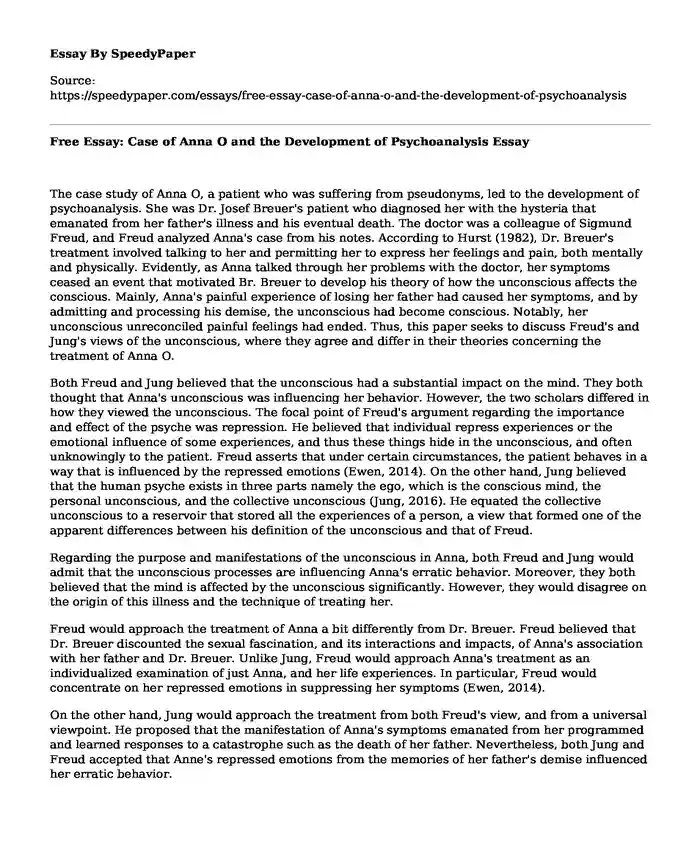
| Type of paper: | Essay |
| Categories: | Counseling Developmental psychology |
| Pages: | 3 |
| Wordcount: | 644 words |
The case study of Anna O, a patient who was suffering from pseudonyms, led to the development of psychoanalysis. She was Dr. Josef Breuer's patient who diagnosed her with the hysteria that emanated from her father's illness and his eventual death. The doctor was a colleague of Sigmund Freud, and Freud analyzed Anna's case from his notes. According to Hurst (1982), Dr. Breuer's treatment involved talking to her and permitting her to express her feelings and pain, both mentally and physically. Evidently, as Anna talked through her problems with the doctor, her symptoms ceased an event that motivated Br. Breuer to develop his theory of how the unconscious affects the conscious. Mainly, Anna's painful experience of losing her father had caused her symptoms, and by admitting and processing his demise, the unconscious had become conscious. Notably, her unconscious unreconciled painful feelings had ended. Thus, this paper seeks to discuss Freud's and Jung's views of the unconscious, where they agree and differ in their theories concerning the treatment of Anna O.
Both Freud and Jung believed that the unconscious had a substantial impact on the mind. They both thought that Anna's unconscious was influencing her behavior. However, the two scholars differed in how they viewed the unconscious. The focal point of Freud's argument regarding the importance and effect of the psyche was repression. He believed that individual repress experiences or the emotional influence of some experiences, and thus these things hide in the unconscious, and often unknowingly to the patient. Freud asserts that under certain circumstances, the patient behaves in a way that is influenced by the repressed emotions (Ewen, 2014). On the other hand, Jung believed that the human psyche exists in three parts namely the ego, which is the conscious mind, the personal unconscious, and the collective unconscious (Jung, 2016). He equated the collective unconscious to a reservoir that stored all the experiences of a person, a view that formed one of the apparent differences between his definition of the unconscious and that of Freud.
Regarding the purpose and manifestations of the unconscious in Anna, both Freud and Jung would admit that the unconscious processes are influencing Anna's erratic behavior. Moreover, they both believed that the mind is affected by the unconscious significantly. However, they would disagree on the origin of this illness and the technique of treating her.
Freud would approach the treatment of Anna a bit differently from Dr. Breuer. Freud believed that Dr. Breuer discounted the sexual fascination, and its interactions and impacts, of Anna's association with her father and Dr. Breuer. Unlike Jung, Freud would approach Anna's treatment as an individualized examination of just Anna, and her life experiences. In particular, Freud would concentrate on her repressed emotions in suppressing her symptoms (Ewen, 2014).
On the other hand, Jung would approach the treatment from both Freud's view, and from a universal viewpoint. He proposed that the manifestation of Anna's symptoms emanated from her programmed and learned responses to a catastrophe such as the death of her father. Nevertheless, both Jung and Freud accepted that Anne's repressed emotions from the memories of her father's demise influenced her erratic behavior.
According to Hurst (1982), Dr, Breuer's strategy of allowing Anna to express her feelings and come to terms with her father's demise cured her of her violent behavior. If Freud or Jung were to treat Anna, they would approach the treatment based on their theories of analyzing the unconscious and its influence on her behavior instead of curing her. Probably, their approaches would not have healed Anna. Instead, Anna would most likely remain in her neurosis because the criteria would have made her perceive herself as an abnormal, sexually disturbed individual.
References
Ewen, R. (2014). An introduction to theories of personality. Psychology Press.
Hurst, L. C. (1982). What was wrong with Anna O?. Journal of the Royal Society of Medicine, 75(2), 129.
Jung, C. (2016). Psychological types. Taylor & Francis.
Cite this page
Free Essay: Case of Anna O and the Development of Psychoanalysis. (2022, Mar 22). Retrieved from https://speedypaper.net/essays/free-essay-case-of-anna-o-and-the-development-of-psychoanalysis
Request Removal
If you are the original author of this essay and no longer wish to have it published on the SpeedyPaper website, please click below to request its removal:
- Food Control Essay Example
- Essay Example on Munchausen Syndrome by Proxy Cases
- Free Essay Highlighting the Problem of Diversity and Inclusion in Army
- Essay Example: The Link between HIV and Poverty in Sub-Saharan Africa
- Free Essay Sample: Religion in Narrative of the Life of Fredrick Douglas
- Author's Voice in Song of Myself by Walt Whitman, Literary Essay Example
- Essay Sample on Tragedy and Art
Popular categories




